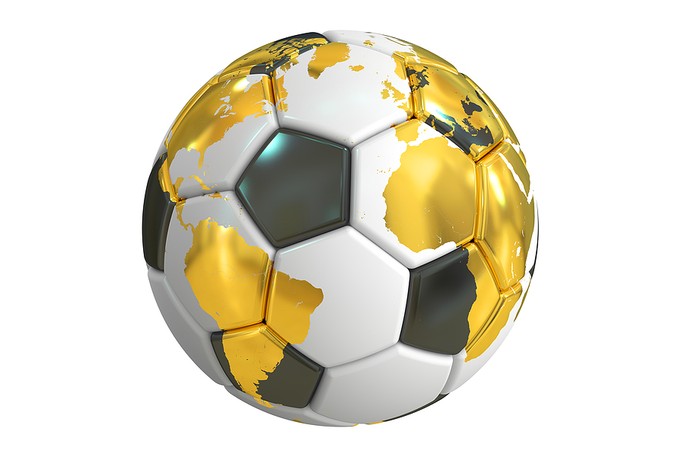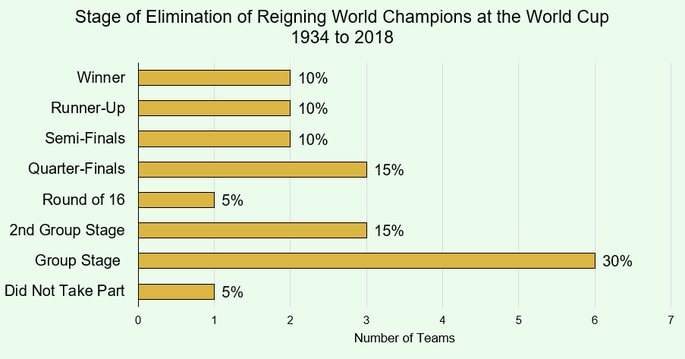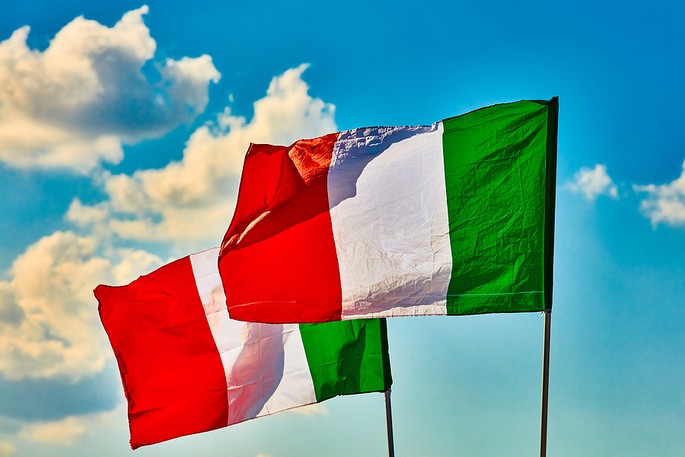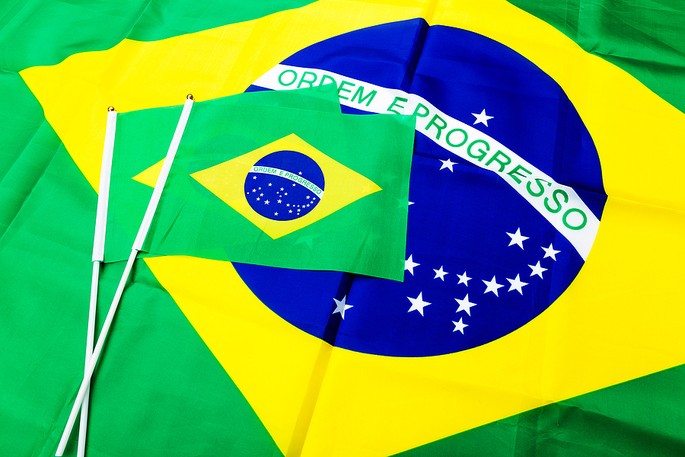
By Daniel, flickr
The World Cup is the pinnacle of international football, putting the best teams on the planet from every continent and confederation against one another. To win it is the highlight of most players’ careers, so it’s little wonder that the various teams gear up to hit it at peak form each time it comes around. The difficulty of the tournament also means it’s extremely difficult to win it once, however, let alone multiple times in succession.
Elsewhere on this site you can read about how winners of the European Championship get on in the World Cup as well as how World Cup winners have done in the Euros that follow, but what about how previous World Cup winners do the next time FIFA’s premier competition rolls around? Does winning the tournament give a nation’s football team an added sense of what it takes to win it again in the future?
Quick Answer: How Many Teams Have Won Back to Back World Cups?
Between 1930 and 2018, Italy in 1934 & 1938 and Brazil in 1958 & 1962 have been the only nations to win back-to-back FIFA World Cups.
Argentina defeated West Germany in the 1986 World Cup Final but the Germans turned the tables when the two sides met in the final of Italia ’90. Brazil were also runners up in 1998 having won the 1994 World Cup, going on to be World Champions again in 2002.
Defending Champions at the World Cup

The first ever World Cup took place in 1930, with future tournaments taking place every four years. The exception to this came during the Second World War, which delayed the follow-up to the 1938 World Cup until 1950. Consequently, there have been plenty of World Cups that we can look at to see how the winners did in the World Cup that followed. Here’s a table explaining exactly that, exploring each winners’ future performance.
Performance of Reigning Champions at the World Cup
| Year | World Cup Winner | Performance At Next World Cup |
|---|---|---|
| 1930 | Uruguay | Did not participate (1934) |
| 1934 | Italy | Winners (1938) |
| 1938 | Italy | Group Stage exit (1950) |
| 1950 | Uruguay | Semi-Finalists (1954) |
| 1954 | West Germany | Semi-Finalists (1958) |
| 1958 | Brazil | Winners (1962) |
| 1962 | Brazil | Group Stage exit (1966) |
| 1966 | England | Quarter-Finalists (1970) |
| 1970 | Brazil | Second Group Stage exit (1974) |
| 1974 | West Germany | Second Group Stage exit (1978) |
| 1978 | Argentina | Second Group Stage exit (1982) |
| 1982 | Italy | Round of 16 exit (1986) |
| 1986 | Argentina | Runners-up (1990) |
| 1990 | West Germany | Quarter-Finalists (1994) |
| 1994 | Brazil | Runners-up (1998) |
| 1998 | France | Group Stage exit (2002) |
| 2002 | Brazil | Quarter-Finalists (2006) |
| 2006 | Italy | Group Stage exit (2010) |
| 2010 | Spain | Group Stage exit (2014) |
| 2014 | Germany | Group Stage exit (2018) |
| 2018 | France | TBD (2022) |
It’s fair to say, then, that teams tend to have a somewhat mixed experience in the World Cup that comes after the one that they won. Italy became the first team to win it in successive years, gaining their first World Cup in 1934 and then winning it again four years later. Might they have won it again in 1942 if the war hadn’t been raging across Europe? We’ll never know, but plenty of Italians will certainly dream.

Six of the 21 World Cup winners to date have exited the tournament at the first Group Stage of the competition following their previous win, with this fate befalling Italy twice, Brazil, West Germany, France, Spain and the united Germany. It suggests that winning the tournament might actually lead to teams targeting you the following competition, given that almost a third of all winners who have failed to make it past the initial stage of the competition.
The Back-to-Back World Cup Winners
Now that we’ve looked at how the winners of the World Cup have got on when the competition has rolled around the next time, let’s take a closer look at those two sides that have managed to win back-to-back World Cups. It’s only happened twice at the time of writing, so are there any lessons to learn from the success of the teams that managed it?
Italy – 1924 & 1938

1934’s iteration of the World Cup was only the competition’s second outing, with the tournament still being in a somewhat formative stage of its development. Indeed, the reigning champions from four years before, Uruguay, chose to boycott the tournament on account of the fact that only four European teams had taken part when they had hosted the World Cup in 1930.
This meant that the holders of the trophy didn’t take part, somewhat taking the shine off it from a competitive point of view. It will forever be known as a World Cup that was used for political means, with Italy’s leader Benito Mussolini keen to demonstrate to the world the benefits of fascism. Accusations of bribery, meddling and corruption marred the tournament, with Mussolini personally believed to have been involved.
Quite whether Italy’s win in 1934 is valid is therefore somewhat up for debate, but the team that won it was considered to be one of the best that played on the international stage. This sense of Italy’s superiority was furthered by the country’s success in the 1936 Summer Olympic football tournament, as well as by the fact that they won the 1938 World Cup when it was hosted by France.
Vittorio Pozzo remained in charge of the Italian national side after his success over the previous four years. The World Cup was absent of Argentina and Uruguay, both of whom felt that the competition should have been held in South American given the fact that it had been in Europe when Italy hosted it four years earlier. Spain were also missing, with the Spanish Civil War preventing them from attending.
It will not be remembered as one of the greatest ever World Cups, with five of the first seven matches needing extra-time to find a winner. That being said, it’s not as if Italy had an easy route to the final, needing to beat France and Brazil on the way to defeating Hungary 4-2 in order to secure their second title and become the first team to win consecutive World Cups.
Brazil – 1958 & 1962

The World Cup was hosted by Sweden in 1958, making it the first and only time that the competition had been hosted by a Nordic country. As hosts, Sweden qualified automatically, though the fact that they made it all the way to the final suggests that they might well have appeared in it even if that hadn’t been the case. It wasn’t a World Cup without incident, with Turkey, Indonesia and Sudan refusing to play their Group Stage matches.
The World Cup was noteworthy from a British point of view as being the only one to date to feature all of the home nations, whilst elsewhere the Soviet Union qualified for the first time. From a competitive point of view, it was the first time that Italy failed to qualify, whilst Uruguay, Spain and Belgium were also absent. The final group game for Brazil saw a young 17-year-old named Pelé get his first taste of World Cup action.
He would go on to set the tournament alight, scoring a hat-trick in the semi-final against France. He went on to be the youngest player to participate in, score in, and win a World Cup all at the same time. Pelé scored twice in the final, sending Brazil to a 5-2 victory over the hosts Sweden. This marked the first time that the host had reached the final of the competition but not gone on to win it.
The 1962 World Cup was hosted by Chile, with many remembering it for the toxic atmosphere that surrounded events and violence often breaking out between the players on the pitch. Indeed, the first round match between the hosts and Italy became known by the moniker ‘the Battle of Santiago’. There was an argument that Chile wasn’t ready to host such a tournament, given that an earthquake in 1960 had damaged the country’s infrastructure.
The competition was hosted there regardless, with stadiums and the county’s infrastructure re-built in record speed. In the end, there were no organisational flaws to the competition, but the violence between the hosts and Italy was sparked by Italian journalists writing that Santiago was a ‘proudly backwards and poverty-stricken dump full of prostitution and crime.’ Despite an injury to Pelé, Brazil won the final 3-1 against Czechoslovakia.
How Did The Runners-Up Do?

Whilst winning the World Cup is the pinnacle of any nation’s footballing achievement, even reaching the final is something to be celebrated. It is with that in mind that it is worth having a look at how the runners-up went on to do when the competition was held four years later. Was missing out in the final match enough of a push to get them back there at the first opportunity, or was it ‘win or bust’ for many finalists?
Performance of Runners-Up at the Next World Cup
| Year | Losing Finalist | Performance At Next World Cup |
|---|---|---|
| 1930 | Argentina | Round of 16 exit (1934) |
| 1934 | Czechoslovakia | Quarter-Finalists (1938) |
| 1938 | Hungary | Did not qualify (1950) |
| 1950 | Brazil | Quarter-Finalists (1954) |
| 1954 | Hungary | Group Stage exit (1958) |
| 1958 | Sweden | Did not qualify (1962) |
| 1962 | Czechoslovakia | Did not qualify (1966) |
| 1966 | West Germany | Semi-Finalists (1970) |
| 1970 | Italy | Group Stage exit (1974) |
| 1974 | Netherlands | Runners-Up (1978) |
| 1978 | Netherlands | Did not qualify (1982) |
| 1982 | West Germany | Runners-Up (1986) |
| 1986 | West Germany | Winners (1990) |
| 1990 | Argentina | Round of 16 exit (1994) |
| 1994 | Italy | Quarter-Finalists (1998) |
| 1998 | Brazil | Winners (2002) |
| 2002 | Germany | Semi-Finalists (2006) |
| 2006 | France | Group Stage exit (2010) |
| 2010 | Netherlands | Semi-Finalists (2014) |
| 2014 | Argentina | Round of 16 exit (2018) |
| 2018 | Croatia | TBD (2022) |
It is interesting to note that only two teams made it to the finals one year before going one better and winning the tournament the year after, which is the same number of teams that have won back-to-back World Cups. It is suggestive of the idea that it takes a monumental effort to even make it to the final and doing so doesn’t in and of itself lock in any level of future of success.
It is also noteworthy that the first team to have made it the final, miss out but then go on to win the following World Cup was West Germany, who required two bites of the apple. Having been losing finalists in 1982, Germany made the final again four years later and missed out once more, only winning the competition for the first time in 1990 when they defeated Argentina, the team that had beaten them four years before, in the final.
